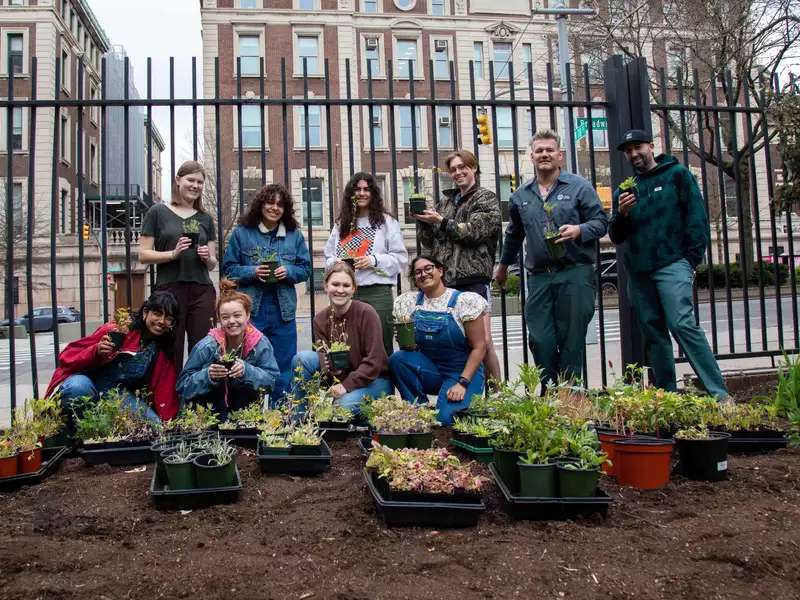When President Bill Clinton signed executive order (EO) 12898 in 1994, the government took a pivotal step to address environmental justice in federal policy and infrastructure. Yet environmental inequity continues to threaten ecologically vulnerable communities.
Nearly three decades and a climate-changed era later, the Biden-Harris administration bolstered the 1994 order with a new one: EO 14096. A provision of the order, signed on April 21, inaugurated the White House Office of Environmental Justice (OEJ) — an interagency office tasked with advancing environmental justice for all by coordinating environmental justice policy and protecting at-risk populations from climate disasters.
Paige West — Claire Tow Professor of Anthropology, 2021 Guggenheim Fellow, and director of Barnard’s political ecology track — calls on research in Papua New Guinea (PNG), which has been facing intense geohazards at the forefront of climate change, to offer a different approach to federal environmental justice: Indigenous self-determination.
The political ecology track, which West created in 2018, offers courses in anthropology, environmental science, and history and enables students to pursue specialized studies in climate change, sustainability, and environmental justice. West works with students at Barnard and in PNG to help them learn how observation-based practices and the inclusion of Indigenous ecological ethos can inform federal and global climate solutions.
She recently co-authored a publication in Oryx about Indigenous marine conservation methods in PNG with longtime collaborator John Aini, the co-founder of Ailan Awareness — an Indigenous NGO that partners with 18 communities in New Ireland Province.
Although EO 14096 does cite Indigenous knowledge as a “relevant actor” to address gaps and inadequacies in the OEJ’s ability to achieve environmental justice, West — careful not to lose sight of the work that still needs to be done — examines the order with cautious optimism in this “Break This Down” interview.
How does establishing the OEJ shift the political tenor regarding potential climate legislation — and why now?
The United States, like all industrialized nations, has an abysmal record with regard to climate change, both nationally and globally. Our government has failed its people and the international community. We should have been leading the way on climate change since the 1970s, and yet almost nothing has been done in the area around mitigation [or efforts to reduce and prevent greenhouse gas emissions].
We should have been leading the way globally on mitigation by phasing out fossil fuels the minute we knew that they were the major cause of climate change. And our government should have been funding adaptation and resilience projects, both internally and internationally for decades. We have not done this. With all of that said, I believe that the creation of this office is a step in the right direction. [It] can make a huge difference in terms of how people can come to live in sustainable and self-determined ways in the face of this crisis.
Does the Biden administration’s EO 14096 go far enough in its effort to advance environmental justice?
My reading of the executive order, and [related] documents, is that the government is finally seeing the relationship between civil rights law and environmental law. When we’re talking about acting within the borders of the United States, we’re talking about acting under and creating new laws and regulations and using our existing case law to address climate-related problems. I believe [the OEJ] can work to create the laws and regulations within our borders that we need if we’re going to tackle the problem of mitigation.
I’ve seen an increasing number of Barnard students who want to be well-versed as scholars in both the social and natural sciences, while having grounding in the humanities.
Your work in Papua New Guinea has focused on climate change and resource extraction from the country’s local communities. When we think about environmental justice, who are its recipients and how can we guide the distribution of this type of justice?
The people of Papua New Guinea should define what environmental justice looks like for their communities and for their country. And those of us who care about that place, and the corporations and governments who have a stake in that place, need to follow the lead of those Indigenous leaders. The United States government is currently pouring an enormous amount of aid money and a military budget into Papua New Guinea, and a large amount of this money will be earmarked for climate-related projects.
What I would like to see the Biden administration do right now is to stop listening to American and Australian consultants, to corporations, and to big international environmental organizations, and really listen to Indigenous environmental leaders from Papua New Guinea. These leaders, whose coastal communities are submerged by king tides, regularly have meetings to figure out if mangroves will help shore up their shorelines. This is a sign that they are still holding on to hope. When it comes to the question of what environmental justice looks like moving forward, leaders like President Biden need to be directed by Indigenous leaders.
How did the political ecology track come to exist?
I’ve seen an increasing number of Barnard students who want to be well-versed as scholars in both the social and natural sciences while having grounding in the humanities. [Political ecology] is a transdisciplinary field that brings together theories and methods from the social sciences, the ecological sciences, law, and the humanities to ask questions about local, regional, and global environmental change.
Climate change is a wicked problem. These are problems that do not lend themselves to understanding, analysis, or solution through single scholarly specialties. So I started the political ecology major with a real sense that our students would be drawn to it.
I was right. The track started four years ago, and we already have 19 political ecology majors who are incredible scholars doing cutting-edge research in their coursework and for their senior thesis projects.
How does EO 14096 broaden political ecology students’ awareness of connections between Indigeneity, planetary health, and policy and the ways in which they will move in the world after they leave Barnard?
Many of the classes in the political ecology track focus on questions of dispossession and the environment. Some of these classes engage with Indigenous scholars and questions that are important to Indigenous communities. But most of the courses engage broadly with questions about environmental justice and environmental change that are important to marginalized and underrepresented communities everywhere, which is a clear goal of the executive order.
After Barnard, I hope that our students take an ethical stance — one that begins with listening and shifts to mobilizing resources — when working with an array of communities. [There is also the] process of [knowing] where to step back. There’s been such a deep history of researchers extracting knowledge from communities that they are not from or part of, and I hope that our students [know to] step away with a different kind of ethics of scholarly engagement.




